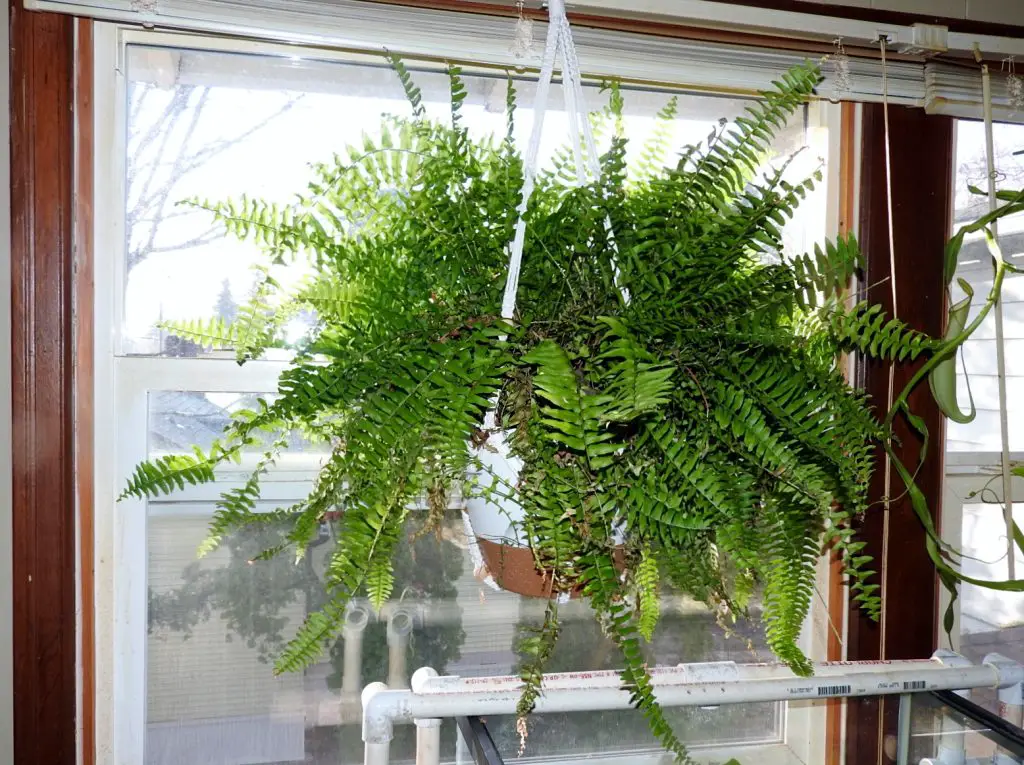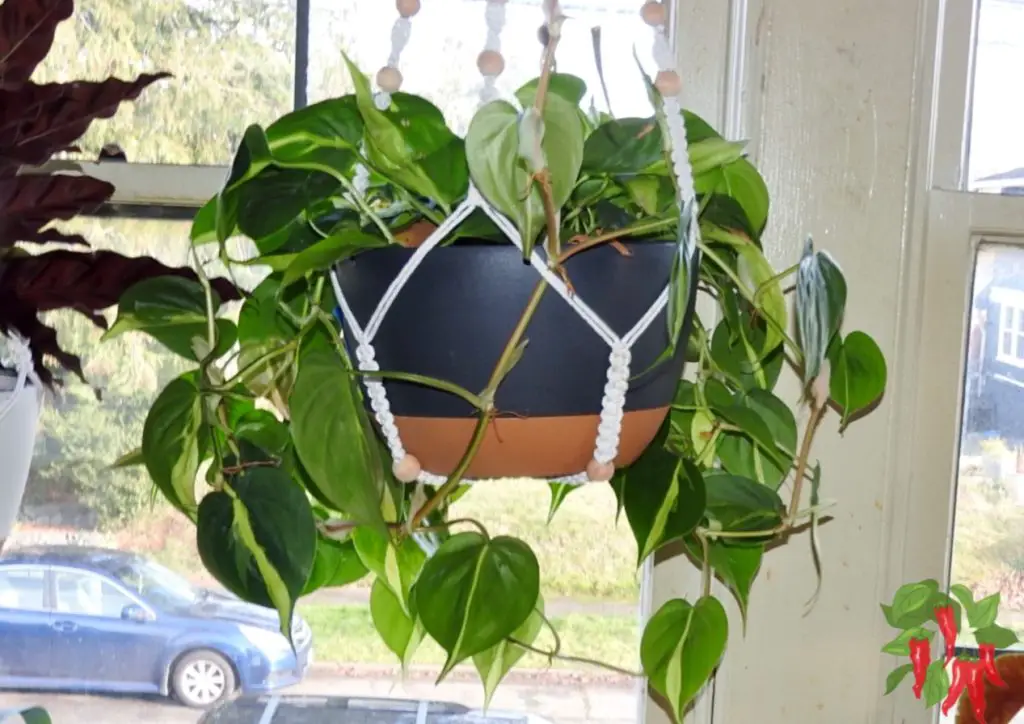This post contains affiliate links. If you buy something from one of our links we may earn a commission. Thanks

Discover how Feng Shui Hanging Plants for Small Spaces can enhance energy and style in your home. Get practical tips for plant lovers in cozy spaces.
Learning How To Choose Feng Shui Hanging Plants for Small Spaces isn’t just about adding greenery it’s also about creating harmony in your home.
The wrong plant in the wrong spot can throw off the vibe, while the right one can bring energy and balance.
Let’s explore simple, practical ways to pick and place plants that feel just right.
Feng Shui Hanging Plants Key Takeaways
- Feng Shui Hanging Plants bring balance and positive energy to small spaces.
- Choose lush, rounded plants like Pothos or Ferns
- Place them where they improve airflow and energy circulation.
- Avoid sharp-leaved varieties and overcrowding to maintain harmony.
- Hanging plants enhance Feng Shui by uplifting stagnant energy in small spaces.
1. How To Choose Feng Shui Hanging Plants for Small Spaces
Incorporating hanging plants into small spaces can enhance aesthetics and energy flow, especially when guided by Feng Shui principles.
While many resources discuss plant selection and placement, they often overlook practical aspects of indoor gardening and the specific benefits of certain plants.
Here’s a comprehensive outline to help you choose Feng Shui-friendly hanging plants for compact areas:
Feng Shui and Its Relevance to Indoor Hanging Plants
Feng Shui, an ancient Chinese practice, focuses on creating balance and harmony in your living space by optimizing energy flow, or “Chi.”
Plants play a key role in this because they embody the wood element, symbolizing growth, vitality, and renewal.
Indoor hanging plants, in particular, are ideal for Feng Shui as they save space while uplifting stagnant energy, bringing life to corners and areas where Chi might feel stuck.
Benefits of Integrating Hanging Plants in Small Spaces
- Improves Air Quality: Hanging plants like pothos and ferns naturally purify the air, making your home feel fresher and more inviting.
- Maximizes Vertical Space: Perfect for small apartments, they free up floor space while adding a lush, vibrant touch to walls or ceilings.
- Boosts Positive Energy: Strategically placed plants enhance Chi, especially in neglected spaces, promoting relaxation and overall well-being.
- Adds Aesthetic Appeal: Their cascading foliage brings warmth and softness to compact areas, making the space feel more open and balanced.
2. Understanding Feng Shui Principles
Bringing Feng Shui into your space isn’t just about following rules. It’s about creating a home that feels good and flows naturally.
Plants, especially hanging ones, play a major role in balancing energy and making small spaces feel alive.
Let’s explore how the wood element and plant placement can work wonders for your space.
The Role of the Wood Element in Feng Shui and Its Association with Plants
The wood element in Feng Shui is all about growth, renewal, and vitality.
Plants embody this energy perfectly, and hanging plants take it a step further by adding a sense of upward and outward movement.
Here’s why the wood element is important:
- Symbol of Growth: Plants represent personal and spiritual development.
- Vitality Boost: They energize dull spaces and bring life to your home.
- Connection to Nature: Even in a small apartment, plants connect you to the natural world.
Hanging plants, with their lush greenery are an easy way to incorporate this element into your home without taking up valuable floor space.
How Hanging Plants Influence Energy Flow and Balance
Energy or “Chi” needs to flow freely for a balanced and harmonious home. Hanging plants can help with this by breaking up stagnant energy and softening harsh areas.
Ways Hanging Plants Improve Energy Flow:
- Fill Empty Corners: These areas can create “dead energy” in Feng Shui. Plants revive these spots.
- Create Soft Transitions: Cascading foliage smooths out harsh edges, making spaces feel cozier.
- Elevate Energy: Hanging plants draw the eye upward, uplifting the overall vibe of your home.
Tips for Strategic Placement
- Near Windows: Keep plants in bright spots to encourage growth and fresh energy.
- Avoid Cluttered Areas: Too many plants can overwhelm and block Chi.
- Focus on Key Spaces: Enhance energy in neglected corners, entryways, or work areas for a balanced feel.
With the right plants in the right spots, your home can feel more peaceful, energized, and connected.
3. Selecting the Right Hanging Plants
Choosing the perfect plants for your small space isn’t just about aesthetics it’s also about creating a calm, inviting atmosphere.
Certain plants radiate positive energy and help balance Chi, while others can disrupt the flow.
Let’s explore a variety of hanging plants that work well for Feng Shui, plus a few to avoid.
Plants with Positive Energy
These hanging plants are ideal for improving air quality, softening harsh edges, and uplifting the energy in your space:
- Golden Pothos
If you’re looking for an easy-care plant that thrives in almost any environment, Golden Pothos is a top choice.
- Easy to care for and thrives in various light conditions.
- Known for its air-purifying qualities and adaptability.
- Its cascading vines bring flowing, harmonious energy.
- Boston Fern
With its lush, feathery fronds, Boston Fern adds a natural, calming vibe to any room.
- Adds lush, vibrant greenery that feels refreshing and calming.
- Improves air quality and balances energy flow.
- Perfect for energizing dull corners or softening harsh edges.
- Spider Plant
A hardy favorite, Spider Plant offers a touch of charm with its arching leaves and “baby” offshoots.
- A classic choice with air-cleaning properties.
- Its gentle arching leaves and offshoots symbolize growth and renewal.
- Thrives in low to medium light, making it versatile for small spaces.
- English Ivy
The English Ivy trailing plant is perfect for creating a classic and graceful look in your home.
- Excellent for creating a natural, elegant look.
- Purifies the air and removes toxins, supporting a fresh and healthy atmosphere.
- Ideal for hanging baskets, with its graceful trailing vines.
- String of Hearts
Delicate and charming, String of Hearts is a unique way to symbolize love and connection in your space.
- A unique plant with heart-shaped leaves that symbolize love and connection.
- Its delicate, cascading growth adds softness to your space.
- Low-maintenance and perfect for Feng Shui-friendly decor.
- Maidenhair Fern
With its delicate, feathery leaves, Maidenhair Fern brings a soft and airy energy to your home.
- Delicate, feathery foliage adds an airy, serene feel.
- Known for its association with purification and vitality.
- Ideal for spaces that need a touch of elegance and energy.
Avoiding Plants with Negative Energy
While most plants bring a sense of life, some can disrupt the harmony in your space. Avoid these choices for better Feng Shui:
- Cactus or Spiky Plants
If a plant has sharp edges, like cacti, it may create “cutting” energy and feel aggressive.- Sharp needles and spines create “cutting” energy, which can feel aggressive and unsettling.
- Not ideal for small spaces where they can dominate the room’s energy.
- Dead or Wilting Plants
Plants that are struggling to survive symbolize stagnation and should be replaced to maintain a positive vibe.- These symbolize stagnation and decline, which can block positive energy.
- Always replace unhealthy plants to maintain a vibrant atmosphere.
- Overly Dense or Cluttered Arrangements
Too many plants in one area can overwhelm the space, leading to blocked Chi.- Too many plants in one area can overwhelm the energy flow.
- Keep your hanging plants spaced out to allow Chi to circulate freely.
By choosing Feng Shui-friendly plants like Golden Pothos, Boston Ferns, and Spider Plants and steering clear of sharp or unhealthy options, your indoor garden can uplift your small space and create a sense of peace and balance.
4. Placement According to the Bagua Map
Where you place your plants matters just as much as the plants you choose.
The Bagua Map is a Feng Shui tool that helps you align your home’s energy with different aspects of your life.

By using this map, you can position your hanging plants to bring harmony, balance, and positive vibes into key areas of your space.
Identifying Key Areas in Your Home for Plant Placement
The Bagua Map divides your home into nine zones, each representing an area of life, such as health, wealth, and relationships.
Hanging plants can enhance these spaces by balancing the energy and promoting a harmonious flow.
Key Placement Areas:
- Wealth and Prosperity (Southeast): Hanging plants here symbolize growth and abundance. A lush Golden Pothos is a great choice for this zone.
- Health and Family (East): Place plants with soft, flowing energy like Boston Ferns to support well-being and strong family bonds.
- Career (North): Use calming plants such as English Ivy to promote focus and steady growth in professional life.
- Relationships (Southwest): Add a String of Hearts to this zone to nurture love and connection.
Enhancing Specific Life Aspects Through Strategic Positioning
Hanging plants can act as energy amplifiers, bringing positive attention to areas you want to improve or balance.
Strategic placement can help align your intentions with the natural energy of your home.
How to Enhance Life Aspects with Plants:
- For Wealth: Choose vibrant, healthy plants and place them in the southeast corner. Adding a small crystal or coin near the plant can boost prosperity energy.
- For Health: Focus on your home’s center. Hanging a lively Boston Fern here can stabilize and enhance overall well-being.
- For Relationships: Place plants with soft, romantic vibes, like String of Hearts, in the southwest. Avoid sharp or spiky plants in this area to keep the energy gentle and harmonious.
- For Creativity: Add a Maidenhair Fern or a Spider Plant to the west to spark inspiration and creative flow.
By aligning your hanging plants with the Bagua Map, you can intentionally enhance energy in specific areas of your life.
Thoughtful placement combines the natural vitality of plants with the principles of Feng Shui, making your home a more balanced and nurturing space.
5. Practical Indoor Gardening Tips
Hanging plants can transform your space, but keeping them healthy requires a little attention to their unique needs.
From light and water to regular maintenance, these practical tips will help you grow lush, vibrant plants that thrive indoors.
Let’s break it down into manageable steps.
Light and Water Requirements
Providing the right amount of light and water is essential for happy, healthy plants. Different species have specific needs, so it’s important to understand what works best for each.
Ensuring Adequate Sunlight:
- Bright, Indirect Light: Most hanging plants, like Golden Pothos or Boston Ferns, thrive in bright but indirect light. Too much direct sunlight can scorch their leaves.
- Low-Light Options: Spider Plants and English Ivy can adapt to lower light conditions, making them ideal for dim corners.
- Rotate for Even Growth: Turn your plants every couple of weeks to ensure all sides get equal light exposure.
Proper Watering Schedules:
- Check the Soil: Allow the top inch of soil to dry out before watering most hanging plants. Ferns, however, prefer consistently moist soil.
- Use a Drip Tray: Prevent messes by placing a drip tray under your hanging plants to catch excess water.
- Use self-watering planters: Eliminate drips and make watering easier.
- Avoid Overwatering: Hanging plants are more prone to root rot if water pools at the bottom. Ensure pots have good drainage.
Maintenance Practices
A little regular care goes a long way in keeping your plants lush and beautiful. Make it part of your routine to keep them healthy and vibrant.
Key Maintenance Practices:
- Pruning:
- Trim dead or yellowing leaves to encourage new growth.
- For trailing plants like String of Hearts, prune back overgrown vines to maintain their shape.
- Dusting Leaves:
- Use a soft, damp cloth to gently clean leaves. Dust buildup can block light and reduce the plant’s ability to photosynthesize.
- Fertilizing:
- Feed your plants with a balanced liquid fertilizer every 4-6 weeks during the growing season.
- Inspect for Pests:
- Regularly check for common pests like spider mites or aphids. Treat infestations quickly with neem oil or insecticidal soap.
By meeting their light and water needs and maintaining a regular care routine, your indoor hanging plants will thrive, adding beauty and positive energy to your home.
Taking just a little time for upkeep ensures your plants remain a source of joy and harmony.
6. Enhancing Small Spaces
Small spaces can feel cozy and inviting when you use hanging plants to add greenery and life.
The trick is to get creative with how you display them and make the most of your vertical space.
Let’s explore some practical and stylish ways to incorporate hanging plants into compact areas.
Creative Hanging Solutions
You don’t need a lot of square footage to make a big impact. The right hanging solutions can help you add plants without cluttering your living area.
Using Ceiling Hooks:
- Ceiling hooks are a go-to for larger hanging plants like Golden Pothos or Boston Ferns.
- Place hooks near windows or bright spots to provide plenty of light.
- Use strong anchors to ensure they can hold the plant’s weight safely.
Wall-Mounted Planters:
- These are perfect for smaller plants like String of Hearts or Maidenhair Ferns.
- Attach planters at staggered heights to create a modern, layered effect.
- They work well in tight spaces like hallways or corners.
Macramé Hangers:
- A trendy option that doubles as functional art.
- Use different designs and lengths to complement your decor.
- Ideal for creating a warm, boho-inspired vibe.
Maximizing Vertical Space
When floor space is limited, going vertical is the key to making a small room feel more spacious and dynamic.
Arranging Plants at Varying Heights:
- Mix plants with short, medium, and long foliage to create layers. For example:
- Hang a Boston Fern higher up for volume.
- Place a String of Hearts mid-level for cascading interest.
- Position a Spider Plant lower for its arching leaves.
Using Multi-Tiered Solutions:
- Install wall-mounted shelves to combine potted and hanging plants.
- Hanging rods or tension bars can be used near windows to suspend several plants at once.
Combining Textures and Sizes:
- Pair glossy-leaf plants like Golden Pothos with feathery varieties like Boston Ferns.
- Use a mix of ceramic pots, woven baskets, and metallic planters for visual contrast.
Lighting Matters:
- Add string lights or LED grow lights around your plants for a magical, glowing effect in the evening.
By combining creative solutions like macramé hangers and wall-mounted planters with smart vertical arrangements, you can turn even the tiniest space into a lush, green oasis.
These techniques enhance your home’s Feng Shui and also bring warmth and vitality to your indoor environment.
7. Personal Experiences and Recommendations
Adding hanging plants to small spaces isn’t just about improving aesthetics. It’s also about creating a sense of calm, balance, and connection to nature.
As someone who has lived in compact apartments, I’ve seen firsthand how the right plants in the right spots can transform a space into a cozy, vibrant haven.
Here’s what I’ve learned, along with some tips to get you started.
Sharing the Positive Impact of Hanging Plants

I remember when I first hung a Heartleaf Philodendron in my small apartment. At first, I worried it might feel cluttered, but the trailing vines actually made the room feel bigger and more welcoming.
Over time, I noticed I enjoyed spending more time there, cooking and even just sitting with a cup of coffee. It softened the hard lines of cabinets and brought life to what was once a sterile corner.
Another favorite was a String of Hearts I placed above my workspace. Its delicate, cascading leaves added a gentle energy that made working at home feel less stressful.
It was a constant reminder to take breaks, water it, and reconnect with the natural world, even in a small space.
Tips on Starting an Indoor Hanging Garden, Even with Limited Space
Starting a hanging garden doesn’t have to be complicated or expensive.
With a little creativity and planning, you can create a green oasis in even the tiniest of homes.
Practical Tips to Begin:
- Start Small: Choose one or two plants, like a Spider Plant or English Ivy, that are easy to care for and adaptable.
- Experiment with Placement: Try different spots like corners, windows, or above shelves. Observe how the plants respond to light and adjust as needed.
- Use Multi-Purpose Hangers: Invest in macramé hangers or wall brackets that double as decor.
Budget-Friendly Solutions:
- Repurpose old containers or jars as hanging pots.
- Use thrift store finds, like baskets, to create a unique look.
Think Vertical:
- Use hooks, shelves, or hanging rods to maximize space.
- Mix hanging plants with smaller pots placed on shelves for a tiered effect.
Keep Maintenance Simple:
- Choose low-maintenance plants like Golden Pothos or Boston Ferns.
- Set a reminder to water on a schedule to avoid over or under-watering.
Starting an indoor hanging garden can do more than just beautify your home. It’s a way to create a personal retreat, even in the busiest or smallest spaces.
Take it one plant at a time, and you’ll soon find your space transformed into a thriving, peaceful haven.
8. Choose Feng Shui Hanging Plants Conclusion
Feng Shui hanging plants offer more than just visual appeal. They also bring balance, fresh energy, and a sense of harmony to even the smallest spaces.
From improving air quality and uplifting stagnant energy to making compact areas feel more open and inviting, these plants are a simple yet powerful way to enhance your home.
Why Feng Shui Hanging Plants Matter
- Energy Balance: These plants help circulate Chi, promoting a peaceful and uplifting atmosphere.
- Air Purification: Many hanging plants improve indoor air quality, making your space healthier.
- Space-Saving Design: Perfect for small spaces, they add greenery without taking up floor space.
Tips for Getting Started
- Experiment with Plants: Start with easy-to-care-for options like Golden Pothos or Boston Ferns.
- Play with Placement: Test different spots and heights to find what feels best.
- Keep It Simple: A few well-placed plants can make a big impact without overwhelming your space.
Key Takeaways
- Feng Shui hanging plants enhance harmony and energy flow in small spaces.
- Popular choices like String of Hearts and Spider Plants are both stylish and functional.
- Experiment with creative displays like ceiling hooks, wall-mounted planters, or macramé hangers.
- Regular care, including proper light and watering, keeps your plants healthy and vibrant.
With a little creativity and care, your home can become a lush, peaceful retreat that reflects your unique style and energy. Happy gardening, and may your hanging plants bring joy and harmony to your life!
Hanging Plants and Vertical Gardens in Feng Shui: Easy Guide
Indoor Plants and Feng Shui: Cultivate Positive Energy in Your Space
Feng Shui Plants: 47 Best Feng Shui Plants for Home
Visit my Amazon Influencer Page for videos and gardening products Grow Your Own Garden







 Hey there, plant lovers! I'm Steve, the green thumb behind
Hey there, plant lovers! I'm Steve, the green thumb behind